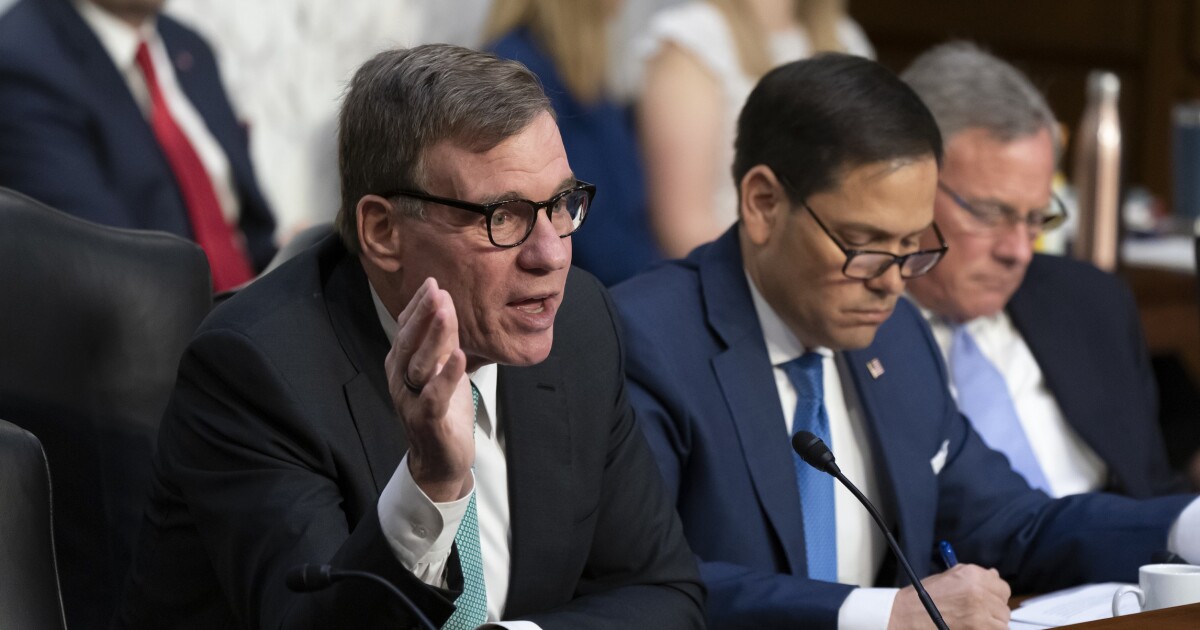

Senate Intelligence Committee members could soon reach a breaking point in their fight with the Biden administration over access to classified documents found in the homes of President Joe Biden and former President Donald Trump.
Months of negotiations over whether lawmakers should get to read the contents of the classified documents have produced no progress, with the Justice Department continuing to cite the existence of two criminal investigations in their denials to the committee.
HOUSE INTELLIGENCE PANEL LEADERS FEAR ADDITIONAL LEAKS: ‘INCREDIBLY DISTURBING’
Now, Senate lawmakers say they will consider creative ways to pressure the Biden administration to cooperate.
Proposals have included withholding funding and even putting limits on the authority of intelligence agencies. Committee members have said they need to review the underlying documents not to determine whether Biden or Trump mishandled them but to gauge how effectively intelligence agencies have managed the potential fallout of the documents’ contents falling into the wrong hands.
Frustration has also mounted over how top administration officials have traded blame for the delays.
Senate Intelligence Committee members say the Office of the Director of National Intelligence has blamed the Justice Department for preventing its cooperation, while the Justice Department has said it has no intention of blocking the committee’s access to the documents.
“I’m surprised to hear the DNI used the word blocking,” Attorney General Merrick Garland testified before Congress on March 28 when pressed by Sen. Jerry Moran (R-KS) about the documents. “I would say we are working well with them. We believe that there is an accommodation possible.”
Garland said the Justice Department has confidence that the administration could find a way to satisfy the committee’s interest without threatening the criminal investigations.
“We intend to work out an arrangement to accommodate those interests,” Garland said.
But no such arrangement has materialized in the weeks since that exchange, and lawmakers appear to be losing their patience.
Sen. Marco Rubio (R-FL), the committee’s top Republican, said Friday that intelligence community funding could be on the chopping block if intelligence officials continue to stonewall lawmakers.
“They’re ruining their relationship with a committee that has always been very responsible and a very good working partner with them,” Rubio told the Hill.
“There’s no doubt that there’s going to be consequences for it. There has to be,” Rubio added. “We have to protect our role on oversight. And the way you do that, unfortunately, is to leverage [the power] that appropriations and authorizations give us.”
Senate Intelligence Committee Chairman Mark Warner (D-VA) recently suggested the committee could threaten the authority of the intelligence community if lawmakers don’t get answers.
“I am done with the lack of willingness of the administration to address this,” Warner said during a recent appearance on MSNBC. “Their position does not pass the smell test. We are going to put limitations on what the IC does, and I am going to encourage my colleagues to do the same on the Justice Department.”
And Sen. Tom Cotton (R-AR) has floated the prospect of blocking Biden nominees until intelligence agencies comply with the committee’s requests.
He said in January that a bipartisan group of lawmakers agreed with the need to “impose pain” on the Biden administration in order to force its hand.
Lawmakers from both parties have noted that the Biden administration’s refusal to share the documents departs from precedent.
During the Trump-era special counsel investigation involving Russia, the Senate Intelligence Committee received more information in a shorter time frame despite the existence of a criminal investigation.
The appointment of two special counsels, one each to oversee investigations of the mishandling of classified documents by both Trump and Biden, has virtually frozen the ODNI’s cooperation with lawmakers.
Senate Intelligence Committee members left a January briefing angry about the lack of answers from Avril Haines, the intelligence director.
The top two members of that committee, Warner and Rubio, as well as the top two leaders of the House and Senate and the top two members of the House Intelligence Committee, a group known as the “Gang of Eight,” left another briefing in February unsatisfied with the answers they received from Haines and other intelligence community leaders.
The inability of Senate Intelligence Committee members to gain insight into the contents of the classified documents amid the special counsel investigation stands in stark contrast to the amount of information about at least the Trump investigation that has ended up in news reports.
Anonymous sources have provided information to reporters about evidence the special counsel’s offices have amassed, including specific documents that have become part of the case and the latest suspicions prosecutors have about Trump’s conduct.
CLICK HERE TO READ MORE FROM THE WASHINGTON EXAMINER
Earlier in the investigation, anonymous sources also characterized to reporters the contents of some of the classified documents discovered in Trump’s home, such as naming Iran as a country about which Trump had classified information and noting that some of the documents related to nuclear secrets.
Spokesmen for Warner and Rubio did not return requests for comment.





